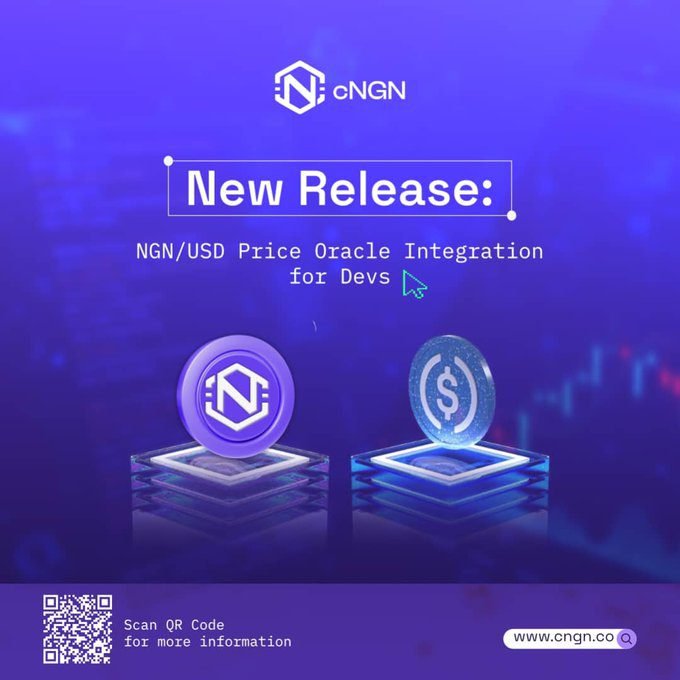In Brief
-
NGN/USD oracle provides developers instant access to trusted naira-dollar exchange rates for on-chain applications.
-
Integration on Base Mainnet enables seamless cNGN-USDT/USDC swaps, boosting liquidity and interoperability across chains.
-
Real-time FX data fuels dynamic pricing, efficient remittances, and innovative Naira-denominated DeFi products for Nigerian and African markets.
Nigeria continues to stand tall as Africa’s leader in cryptocurrency adoptions, especially with recent updates to the cNGN stablecoin, a regulated digital asset pegged to the Nigerian Naira.
The initiative, developed by the Africa Stablecoin Consortium, aims to bridge traditional finance with a decentralized system.
This article dives into recent technical developments and the integration of Chainlink’s NGN/USD price oracle on Base Mainnet.
This powerful collaboration represents a monumental backend upgrade and a shife to supercharge the next generation of crypto financial apps across Africa, particularly in Nigeria.
The Role of the NGN/USD Price Oracle in Financial Innovation
On June 6th, cNGN stablecoin announced a dedicated NGN/USD price oracle, effectively acting as a bridge between blockchain and real-world economic data.
Developers can now have instant, trusted access to real-time exchange rates between Nigerian Naira and the US Dollar, right where they are building their applications.
In addition, the oracle enables seamless swaps between cNGN and other stablecoins like USDT/USDC directly on-chain, facilitating liquidity and interoperability.
CHECK OUT:Nigeria Stablecoin Transactions Boom: A Positive Financial Shift
This elevates the naira stablecoins into global markets while still providing local context, enabling developers to build stablecoin swap applications easily.
The Base + Chainlink integration powers these capabilities, further building Nigerian remittance solutions, which are already dominant within the region.
Beyond core finances, the oracle enabled dynamic pricing models.
Currently, Africa is experiencing a newfound wave of entrepreneurs, with many leveraging Ecommerce and stablecoin payments within startups for global reach.
Innovators can display prices in Naira that automatically adjust based on real-time FX movements, while saving apps can offer Naira-denominated digital saving products with transparent value reaching against the dollar.
Understanding the Engine: Base Mainnet and Chainlink Oracles
Let’s dive into the core components to get a better understanding.
Base mainnet is an Ethereum Layer 2 scaling solution incubated by Coinbase. It’s typically a high-speed express lane built alongside the main Ethereum highway.
It comes with a few perks, like ETH’s robust security and dramatically low gas fees with added speed.
This factor has made Base a go-to option for many African developers seeking to build practical applications in markets sensitive to fees like Nigeria, Kenya and South Africa.
Chainlink, on the other hand, is the world’s leading decentralized oracle network.

Chainlink oracle on Base Mainnet enables real-time Naira-Dollar swaps, reducing remittance costs and boosting DeFi adoption in Nigeria.[Photo: X]
Chainlink’s reputation for high-quality, tamper-resistant data feeds, securing billions in value, makes it the industry standard.
The NGN/USD price oracle, powered by Chainlink, ensures reliable data feeds for applications like stablecoin swaps, on-chain remittances, and NGN-denominated DeFi products.
Nigerian Remittance Solutions and the Future of Cross-Border Payments
Nigeria has been a core entity driving Africa’s digital asset adoptions. DeFi in Nigeria has exploded over the past decade, dominating the space with its high usage rate and growing investor interest.
The NGN/USD price oracle fuels this initiative by drastically reducing remittance costs, making international transactions even cheaper.
In addition, the stablecoin‘s 1:1 ratio, plus its blockchain enhancements, make it a suitable option for facilitating conversations and prime mediums for lending platforms leveraging on DeFi.
Moreover, the cNGN stablecoin’s multi-chain support (including Bantu, Ethereum, and Polygon) ensures interoperability, allowing developers to deploy apps across diverse networks.
This flexibility appeals more to digital asset users who often juggle multiple platforms for payment saving and trading.
CHECK OUT:Stablecoins in Hyperinflationary Markets: A Survival Guide for African Entrepreneurs
According to statistics, Nigeria received over $125 billion in on-chain value in 2023-2024.
This showcases how digital assets have become a lucrative economy on their own.
Fortunately, unlike CBN’s eNaira, which most consider a failure, cNGN is privately issued and operates in multiple chains, providing broader options for users.
The lack of intermediaries while using real-time exchange rates and blockchain-based remittances can bypass the inefficiencies of legacy systems.
For example, a sender in the US could convert USD to cNGN via a smart contract, ensuring the recipient receives Naira instantly at a fair rate.
A Foundation for Financial Innovation
While the NGN/USD price oracle provides added benefits from Base Mainnet and Chainline, regulatory scrutiny remains a major concern. Since the digital asset is a stablecoin, not a CBDC, CBN has yet to embrace it fully.
Additionally, some concerns still loom over the naira inflation. Its practicability tips the scale in its favour.
The added functionalities empower the creation of efficient remittance services, robust Naira-denominated DeFi protocols, seamless stablecoin swap applications centred around cNGN and dynamic commercial solutions.
These are all core to Nigeria’s digital economy.
These developments reflect why and how Nigeria has dominated Africa’s crypto sphere and dApp developments.
The NGN/USD oracle on Base Mainnet provides the critical pricing infrastructure needed to unlock a new era of inclusive, efficient, and innovative crypto-financial apps for millions across Nigeria and beyond.
